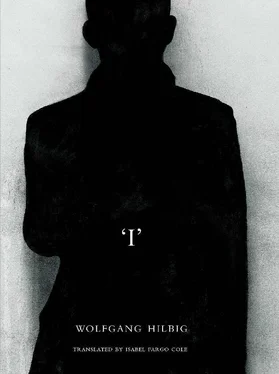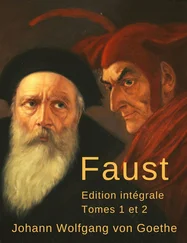The same went for Cindy; face pale, close to tears but fighting them bravely, she said: They can only do that because no one can bail out over their borders.
W. agreed; he would have thought she’d be more jaded, though, since it was hardly her first time, and besides it was really a minimal sentence. His explanation was that she’d had to live with the unpleasant prospect for an entire year. Now he thought he understood the rather grim expression he’d noticed lately in her otherwise soft and girlish face. Her eyes had begun to flicker, too; with the smoke from her cigarette she sucked air audibly between her teeth, then bit her lips together, which gave her a severe, determined expression. She stared at W. with bloodshot eyes.
He avoided her gaze and asked as casually as possible: Is it your first time in there?
Of course, she said, what do you think? But even if it weren’t, I know what it’s like for Harry. . for him it gets worse and worse every time.
It’s not like you have to compete with him! said W.
He didn’t believe her, incidentally; as far as he’d heard, it wasn’t customary to keep debutants waiting to start their sentence, given the incalculable risks which the involuntary postponement entailed; as a rule, self-reporters were repeat offenders whose behaviour was familiar to the authorities.
Over the course of the evening they drank a great deal of alcohol, and W. was nervous when it came to paying the bill. To console Cindy he walked her home afterwards. She lived at the other end of town, her street was in the exact opposite direction from his; she accepted his companionship in the ice-cold night as indifferently as she’d watched the bill being paid, taciturn and preoccupied as they walked. W., not without ulterior motives in accompanying her, was disappointed once again. — She had things to pack and didn’t have the time, she said at the door to her building, and even refused him the obligatory parting kiss. W., holding her by the hips, hesitated, feeling rebuffed. — You’d just regret it, she said; and the words that followed seemed odd to him, but he put them down to the tension of her situation: You’d think about it for ever, but you’d have gotten nothing out of it, you’d just regret it. It’s better if you keep your hands off me. . I’ve got other things on my mind. All you’ll get is trouble, if I were you I’d have gotten out of here long ago.
He wasn’t the type to assert himself against other people’s will; he headed home. — Over the following months he lost almost all contact with the circle of pub-crawlers; he had to admit to himself that it was really only Cindy who’d still kept him coming; and last but not least, he’d plunged back into literature, reading a whole series of books, each halfway through, putting back the rest for later, and continued working on a conglomeration of texts with no idea what it was meant to become. He’d been working on this opus — more a collection of fragments — for years now, but usually he’d given up again after a week of trying. This time he kept at it from early spring to the beginning of autumn, albeit without achieving any satisfying results. The text or texts — it was really impossible to say — were an uneven mixture of hypertrophic self-stylization (of an invented self) and the sober description of everyday details from his real life. In his ‘fictions’ his I often fled so far into fantastic realms — remote times or thought-up landscapes — that he had to drag it back by inserting his boring reality: to keep from losing it entirely! — Usually these were descriptions of his evenings at the pub, the alcohol he consumed there serving as a pretext for detaching his I from reality.
All that summer he spent most of his time at the bars his colleagues went to after work — as though this too might help him keep his bearings at a time when he seemed to struggle to maintain his grip on reality. And he was made to feel the extent of the mistrust that had already built up against him. A distance had developed, one he sensed nowhere near as clearly during working hours in the factory: now he suddenly realized that they had become suspicious of him. . no doubt, he surmised, due to his dealings with people who in his colleagues’ opinion disdained steady employment; in other words, his colleagues felt disdained by a bunch of barflies, and punished them for it with redoubled contempt! Earlier W. had mainly had to listen to his colleagues’ jibes after he racked up absences due to his alcohol-sodden nights (meanwhile putting up with his drinking buddies’ jokes when he left to make it to work early the next morning, which he didn’t always manage, not by a long shot). . now the accusations against him had become more concrete — the less justified they were, the more vexing they grew. — Once he was asked whether he only took notes on what went on at the factory, or also on what they, his colleagues, talked about here in the pub. Alarmed, he beat a retreat for that evening, shaking his head. — Then he recalled one time at the factory when he’d been seen noting down a few thoughts he wanted to remember to put in his literary opus. He was sitting in the empty staff room, a largish basement room next to the factory kitchen; above him, at head height, was a ground-level window, and suddenly its light had gone dark; looking up, he saw the awkwardly grinning faces of several onlookers who made off as soon as he spotted them.
And so it wasn’t just the disrepute gained by association with a bunch of so-called shirkers. Suddenly W. faced the suspicions the workers felt towards a person who wrote down mysterious words he refused to divulge to them.
This person laboriously plotting formulations onto paper. . and they must have seen how he squeezed the words that wouldn’t fit, how he choked on them; you could almost hear him holding his breath and groaning. . whom was this grim-faced person describing, whom had this notary denounced just now, gazing up with such a stricken look? Whom was he fooling with his oil-stained, sooty clothes, if not his colleagues. . what was he putting himself above, what was he agitating against? You could smell how he got off on the imperfection of the collective he’d wormed his way into. . even if he was still hunkering down in his hole, he had long since risen to a different estate. He himself need not have sensed it yet, but it was obvious to each of the colleagues he’d forsaken. Each one smelt it. . it was the class sense of smell. . the workers had immediately grasped the full import of his actions. — He who first set pen to paper was all too deserving of suspicion. Their wordless wisdom recognized the rupture at once: he had erected a wall of letters between them. . and from then on he was a man of the Party. There was no other explanation! Possibly, too, he was the man of an opposing party. . no matter; true to the letter of the law, as the saying went, he was now ascending into realms in which they, the workers, were nothing but cheap propaganda material. And that made this scribbler a still sleazier character — as they’d always suspected — than the drinkers he associated with for his decadent purposes: it made him one of the scoundrels who wrote for the apocalypse. .
No doubt about it, here he was getting at what went on in the minds of the working class in this country. . any somewhat-more-benign supposition would have been a lazy evasion (incidentally, Feuerbach appreciated those who harboured no illusions about the relationship between intellectuals and workers in this country; he was convinced of the truth of a certain legend: at the Firm they often claimed to have good relations with the real men on the production front, better at least than with artists and writers. .)
Never you mind about that. — One evening at the pub, late in September, W. heard from a colleague — the one who had once asked about the notes he was taking — that the ‘dyed redhead with the Afro-wig’ would be back from the slammer any day now, if she wasn’t back already, and now the Nook and the Fuse would be hopping again, two of the pubs W. had avoided that summer. — It was hard to picture how this colleague had found out the date of her release; a small town had no secrets. W. himself had hardly given Cindy another thought. . he’d been preoccupied with his writing attempts: the only possibly strange thing was that all the female characters in his texts had red hair — and no faces; their faces were left as white sheets of paper on which any mark might be made.
Читать дальше












